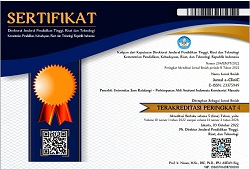Pengaruh Riwayat Kejang Demam terhadap Kejadian Epilepsi pada Anak
DOI:
https://doi.org/10.35790/ecl.v11i1.44268Abstract
Abstract: Epilepsy could cause various kinds of problems including learning difficulties, growth and development disorders, and poor quality of life of children in the future. There are several risk factors of febrile seizures that coud affect the occurrence of epilepsy inter alia abnormalities of the nervous system or there is a clear development of nervous system abnormalities before the seizure, complex febrile seizures, history of epilepsy in parents or siblings, as well as simple febrile seizures repeating four or more episodes in one year. Each of these risk factors increases the likeli-hood of epilepsy, and the combination of these risk factors increases the incidence of epilepsy. This study aimed to determine the effect of a history of febrile seizures on the incidence of epilepsy in children. This was a literature review study using three databases namely Pubmed, ClinicalKey, and Google Scholar. The keywords used were febrile seizure AND epilepsy AND children. Selection with inclusion and exclusion criteria obtained 10 literatures. The results showed that from 10 literatures reviewed, history of febrile seizures was the most common risk factor that influenced the developing of epilepsy in later life. In conclusion, history of febrile seizures is the most common risk factor for developing epilepsy in children later in life. The percentage of children with history of febrile seizure that develop to epilepsy is 3.3% - 73.8%.
Keywords: febrile seizures; epilepsy; children
Abstrak: Epilepsi dapat menyebabkan berbagai macam permasalahan berupa kesulitan dalam belajar, gangguan pertumbuhan dan perkembangan, serta kualitas hidup yang kurang pada anak di masa depan. Terdapat beberapa faktor risiko kejang demam yang berperan terhadap terjadinya epilepsi, di antaranya: kelainan pada sistem saraf atau adanya perkembangan kelainan yang jelas sebelum kejang, kejang demam kompleks, riwayat epilepsi pada orang tua atau suadara kandung, dan kejang demam sederhana yang berulang empat episode atau lebih dalam satu tahun. Masing-masing faktor risiko tersebut meningkatkan kemungkinan kejadian epilepsi dan kombinasi faktor risiko tersebut akan meningkatkan kejadian epilepsi. Penelitian ini bertujuan untuk mengetahui pengaruh riwayat kejang demam terhadap kejadian epilepsi pada anak. Penelitian ini berbentuk literature review, menggunakan tiga database yaitu Pubmed, ClinicalKey, dan Google Scholar. Kata kunci yang digunakan yaitu febrile seizure AND epilepsy AND children. Hasil seleksi dengan kriteria inklusi dan eksklusi mendapatkan 10 literatur. Hasil penelitian menunjukkan bahwa dari sepuluh jurnal yang di-review, didapatkan riwayat kejang demam menjadi salah satu faktor risiko yang memiliki pengaruh untuk berkembang menjadi epilepsi di kemudian hari. Simpulan penelitian ini ialah riwayat kejang demam merupakan faktor risiko terbanyak untuk berkembang menjadi epilepsi pada anak di kemudian hari. Persentase anak dengan riwayat kejang demam yang berkembang menjadi epilepsi berkisar antara 3,3% - 73,8%.
Kata kunci: kejang demam; epilepsi; anak
Downloads
Published
How to Cite
Issue
Section
License
COPYRIGHT
Authors who publish with this journal agree to the following terms:
Authors hold their copyright and grant this journal the privilege of first publication, with the work simultaneously licensed under a Creative Commons Attribution License that permits others to impart the work with an acknowledgment of the work's origin and initial publication by this journal.
Authors can enter into separate or additional contractual arrangements for the non-exclusive distribution of the journal's published version of the work (for example, post it to an institutional repository or publish it in a book), with an acknowledgment of its underlying publication in this journal.
Authors are permitted and encouraged to post their work online (for example, in institutional repositories or on their website) as it can lead to productive exchanges, as well as earlier and greater citation of the published work (See The Effect of Open Access).







